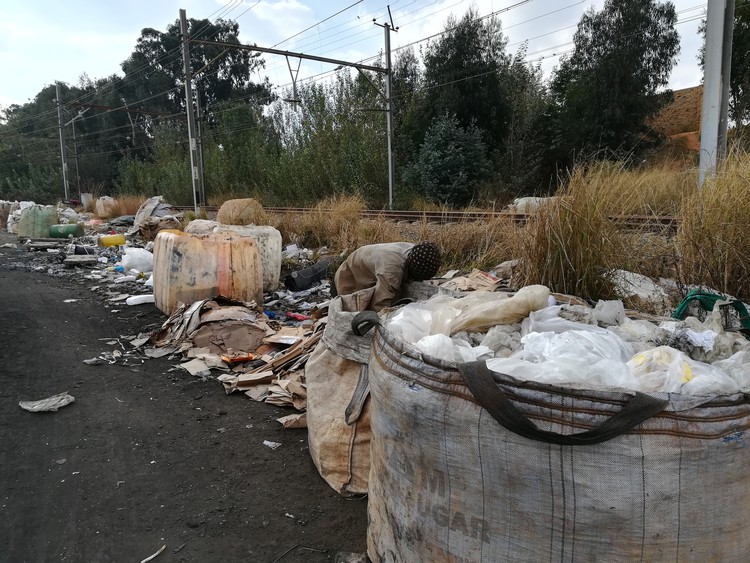Claiming the wasted opportunities in recycling
Pilot project in Brixton and Auckland Park brings informal waste pickers and residents together to benefit both

A pilot project called “recycling with reclaimers” aims to bring residents and reclaimers (people who collect and sell recyclable materials) together, instead of residents recycling through private companies contracted by the City of Johannesburg.
Launched on Monday, the initiative partners residents of Brixton and Auckland Park with African Reclaimers Organisation (ARO) and Unilever.
“Recycling with reclaimers brings residents and reclaimers together to protect the environment, increase reclaimers’ incomes, improve their working conditions, and provide reclaimers with job security. It is also a way to create a better kind of city where different kinds of people get to know each other, value each other, and support each other,” reads the explanatory note.
According to Luyanda Hlatshwayo, a reclaimer with ARO, residents will be given a clear plastic bag to put their recyclables materials in – including paper, cans, juice and milk cartons, polystyrene, cardboard and steel.
On the day before the usual municipal collection, 50 reclaimers dressed in green uniforms and carrying ID cards will collect the bags and give the residents a new recycling bag for the following week.
The bag of recyclable material will be weighed and reclaimers will be paid a top up fee of 50c per kilogram over and above what they receive for the recyclable materials when they take them to one of the city’s buy-back centres.
Sophia Welz, a member of the Brixton Community Forum, said the aim of the pilot project was to develop an implementable model that other areas could use in the future. She said the community and ARO would be recording progress and failures to see how it can be improved.
A year and a half ago a visiting academic introduced Welz to an organisation that worked with reclaimers. Shortly after this, Welz invited reclaimers from ARO to a Brixton park clean up and since then they have been looking for new ways to collaborate.
“It was a really successful [first] meeting. I think everyone left there knowing a bit more and we hope that the reclaimers felt valued, because that’s one of our main things, we value the work that they do,” said Welz.
Melanie Samson, a researcher at Wits who works with reclaimers, said in her presentation to the community that reclaimers collect up to about 90% of recyclable materials from households. Depending on how the landfill space is valued, reclaimers are estimated to save municipalities up to R750 million a year in landfill space by diverting recyclables away from landfills.
But, she said, reclaimers do not get paid a service fee for their work and are often in competition with private waste companies that have more resources.
Eli Kodisang, an organiser with ARO, said Unilever had agreed to sponsor the pilot project, including a service fee for reclaimers. He said the service fee of 50c per kilogram was a balance between making it worthwhile for the reclaimers and still making it financially viable for the City should it decide to implement the model.
Kodisang said the aim was to get the City to use some of the money that reclaimers saved it to pay the reclaimers a service fee which would help stabilise the income for reclaimers because the prices of materials often fluctuate depending on the time of the year.
“These are black men and women who have created this system that sustains their livelihoods because they have no other choice. They are saving the municipalities a lot of money but the City would rather pay private companies to do the work that reclaimers do,” said Kodisang.
He said the City made policy decisions based on ideology rather than existing practices and that has resulted in further problems.
“For example, the City decided to hire these private companies which forced reclaimers to start sleeping in parks because they needed to beat the trucks to get access to the recyclable materials,” said Kodisang.
The current system was not benefiting anyone because reclaimers end up sleeping in parks, the recycling companies do not get the materials, and the City ends up spending money on companies that do not provide the service, he said.
This pilot project was different because the reclaimers collected the bags a day before the usual pick up, giving them full access to the recyclable materials in the community.
Another benefit of the project was to allow reclaimers and residents to form relationships. “We want to show the residents that reclaimers are not people who are looking for charity but they are actively participating in this profession and they need to be recognised and paid accordingly,” said Kodisang.
CORRECTION: An earlier version of this article incorrectly identified Eli Kodisang as the chairperson of ARO.
Support independent journalism
Donate using Payfast

Don't miss out on the latest news
We respect your privacy, and promise we won't spam you.
Next: Philippi farmers challenge City on development of agricultural land
Previous: Tshikota residents block roads, demand reliable water supply
© 2019 GroundUp.
This article is licensed under a Creative Commons Attribution-NoDerivatives 4.0 International License.
You may republish this article, so long as you credit the authors and GroundUp, and do not change the text. Please include a link back to the original article.
